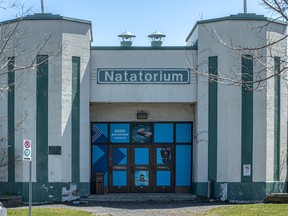“You have an unfortunate tendency of demolishing,” a Verdun citizen said during question period.

Article content
The city of Montreal’s suggestion for the historic Natatorium swimming pavilion in Verdun is for it to be torn down and rebuilt, Borough Mayor Marie-Andrée Auger announced at a special council meeting Tuesday night.
Auger said there’s too much work needed for restoration of the building to make sense, despite that being her preference. She described a demolition and rebuild as a “last resort.”
Advertisement 2
Article content
Article content
“I want to repeat myself, my first choice was restoration,” Auger said. “And when I was presented the scenario of reconstruction, I didn’t accept it. We continued the work, and we continued to explain the ‘why’ to me … we added layers of validation.
“And I will tell you that when we’re talking about restoration, it’s because we can preserve a good part of a decomposing building. If we have to destroy and rebuild the majority, then honestly, in that scenario, we have to talk about reconstruction.”
The Natatorium’s pavilion has been closed since the fall of 2017, when major fissures were discovered during renovations to make it more accessible to people with reduced mobility. Supports were installed to reinforce the roof and floors. In the time since, studies and expert reports were carried out to determine the future of the building. The site of the Natatorium, with the pools, will remain.
The plan may have been different if the building were made of brick or stone, Auger said, but since it’s made of concrete that has been eroded by chlorine over the years because of poor ventilation, removing the concrete to add more would be the equivalent of starting over.
Article content
Advertisement 3
Article content
A detailed presentation was given on the state of the art deco building Tuesday, describing the structural damage in detail, with photos. It included advantages and disadvantages of both the restoration scenario and the reconstruction scenario, listing more advantages and fewer inconveniences for the latter.

The presentation did not include prices for both scenarios, but Annie Longpré, project management team leader with the city of Montreal, said restoring the building would cost 36 per cent more than building a new one.
Constructed at the same time as the Verdun Auditorium, the Natatorium, which was inaugurated in 1940, was Canada’s largest outdoor swimming pool until Jean-Drapeau Park and its aquatic complex were built.
Former Verdun mayor Jean-François Parenteau said ahead of Tuesday’s meeting that he’s against demolition for several reasons.
“It’s historical and also it represents part of the history of not only Verdun, but Quebec and Canada too,” he said. “The Natatorium was built at the same time as the (Verdun) Auditorium and the Chalet du Mont-Royal and the Chalet de l’Île Ste-Hélène and different projects to try to restart the economy (after the great depression).”
Advertisement 4
Article content
Parenteau said the pavilion is important for a lot of Verdun community members.
“The people who grew up in Verdun, they went to the Natatorium and they have a lot of memories from there,” he said.
There was a full house of Verdun citizens at Tuesday’s council meeting, with another near-300 attending online. Many in person delivered impassioned speeches against demolition.
Thierry Cerpolet, a photographer who has lived in Verdun for 31 years, was one of them.
“I’m very concerned by the fact that we always prioritize, in Quebec, demolishing and rebuilding something new instead of keeping the fundamental heritage of a city,” he said. “You have an unfortunate tendency of demolishing because at the price level, it’s always more interesting to demolish … You have a unique, art deco building that is extraordinary, that is visually exceptional, and you want to create something entirely new?”
Cerpolet’s words were met with applause from citizens.

Former Verdun Mayor Georges Bossé said if the building really does need to be torn down because of issues with the concrete, experts should have been brought in from that field to deliver the information.
Advertisement 5
Article content
“Not civil servants from the city of Montreal or Verdun or wherever else,” he said.
Bossé said if the building were located in older parts of the city or at Jean-Drapeau, “you would never demolish it.”
His words were also met with applause.
Michel Soulières, project management director for the city of Montreal, said those experts were consulted before the plan was presented Tuesday.
“They’re not my results, they’re results of a committee of experts,” he said.
Auger said there are more steps to come and that the city will have to defend the demolishing and rebuilding scenario to heritage experts.
Parenteau said ahead of the meeting he hopes the plan will change.
“They’re in a very difficult position because I understand the financial situation,” he said. “But there are possibilities; there are options. They have to look everywhere. It was the same thing with the auditorium, they wanted to destroy it — we succeeded.”
He added: “You cannot, on the eve of the 150th (anniversary) of Verdun, in an election year, maintain this position.”
Tuesday’s presentation suggests work would begin in 2027 for a 2030 opening.
Recommended from Editorial
Advertisement 6
Article content
Article content





